
Panay is the sixth-largest and fourth-most populous island in the Philippines, with a total land area of 12,011 km2 (4,637 sq mi) and a total population of 4,542,926, as of 2020 census. Panay comprises 4.4 percent of the entire population of the country. The City of Iloilo is its largest settlement with a total population of 457,626 inhabitants, as of 2020 census.

Iloilo, also called Iloilo Province, officially the Province of Iloilo, is a province in the Philippines located in the Western Visayas region. Its capital and largest city is Iloilo City, the regional center of Western Visayas and politically independent from the province. Iloilo occupies the southeast portion of the Visayan island of Panay and is bordered by the province of Antique to the west, Capiz to the north, the Jintotolo Channel to the northeast, the Guimaras Strait to the east, and the Iloilo Strait and Panay Gulf to the southwest.
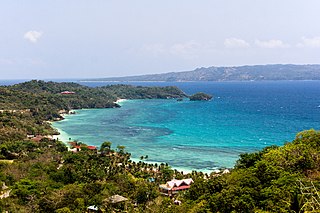
Aklan, officially the Province of Aklan, is a province in the Western Visayas region of the Philippines. Its capital and largest town is Kalibo. The province is situated in the northwest portion of Panay Island, bordering Antique to the southwest, and Capiz to the southeast. Aklan faces the Sibuyan Sea and Romblon province to the north.
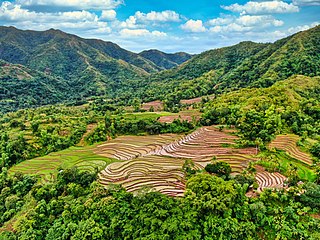
Antique, officially the Province of Antique, is a province in the Philippines located in the Western Visayas region. Its capital is San Jose de Buenavista, the most populous town in Antique. The province is situated in the western section of Panay Island and borders Aklan, Capiz and Iloilo to the east, while facing the Sulu Sea to the west.

Capiz, officially the Province of Capiz, is a province in the Philippines located in the central section of Western Visayas region. Its capital is the city of Roxas, which is the most populous. It is located at the northeastern portion of Panay Island, bordering Aklan to the north, Antique to the west, and Iloilo to the south. Capiz faces the Sibuyan Sea to the north.

Boracay is a resort island in the Western Visayas region of the Philippines, located 0.8 kilometers (0.50 mi) off the northwest coast of Panay island. It has a total land area of 10.32 square kilometers (3.98 sq mi), under the jurisdiction of three barangays in Malay, Aklan, and had a population of 37,802 in 2020.

Lorna Regina "Loren" Bautista Legarda is a Filipina politician, environmentalist, cultural worker, and former journalist who is currently serving as a Senator and served as the president pro tempore of the Senate of the Philippines from 2022 to 2024. This also makes her the first woman to serve as Senate President Pro Tempore in the upper chamber's history. Before entering politics, she began her career as a news reporter until becoming a news anchor. She previously served three terms in the Senate from 1998 to 2004 and from 2007 to 2019. She is the longest-serving female Senator in the history of the Senate, and the only female in the Philippines to top two senatorial elections: 1998 and 2007. Legarda was also the House Deputy Speaker during her three-year stint as the representative of Antique from 2019 to 2022.

RoxasTagalog pronunciation:[ˈɾohas], officially the City of Roxas, is a 3rd class component city and capital of the province of Capiz, Philippines. According to the 2020 census, it has a population of 179,292 people, making it the most populous city in Capiz and also the second-most populous city in Western Visayas, after Iloilo City.

Valencia, officially the Municipality of Valencia, is a 1st class municipality in the province of Negros Oriental, Philippines. According to the 2020 census, it has a population of 38,733 people.
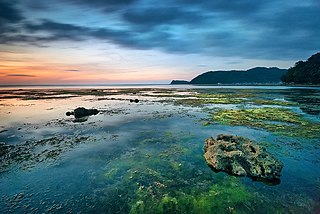
Buruanga, officially the Municipality of Buruanga, is a 5th class municipality in the province of Aklan, Philippines. It is the farthest town of Aklan from its provincial capital. According to the 2020 census, it has a population of 19,357 people.

Nabas, officially the Municipality of Nabas, is a 4th class municipality in the province of Aklan, Philippines. Nabas serves as the arrival gateway of Boracay Airport. According to the 2020 census, it has a population of 40,632 people, making it the fifth most populous town in Aklan Province..

Pandan, officially the Municipality of Pandan, is a 3rd class municipality in the province of Antique, Philippines. According to the 2020 census, it has a population of 35,965 people. Making it 7th most populous municipality in the province of Antique.

Oton, officially the Municipality of Oton, is a 1st class municipality in the province of Iloilo, Philippines. According to the 2020 census, it has a population of 98,509 people making it as the most populous town in the province and the entire Panay island.

Tourism is an important sector for the Philippine economy. The travel and tourism industry contributed 8.6% to the country's GDP in 2023; this was lower than the 12.7% recorded in 2019 prior to the COVID-19 lockdowns. Coastal tourism, encompassing beach and diving activities, constitutes 25% of the Philippines' tourism revenue, serving as its primary income source in the sector. Popular destinations among tourists include Boracay, Palawan, Cebu and Siargao. While the Philippines has encountered political and social challenges that have affected its tourism industry, the country has also taken steps to address these issues. Over the past years, there have been efforts to improve political stability, enhance security measures, and promote social inclusivity, all of which contribute to creating a more favorable environment for tourism, such as the Boracay rehabilitation.
The Karay-a are a Visayan ethnic group native to the islands of Panay and Palawan in the Philippines. They speak the Karay-a language.
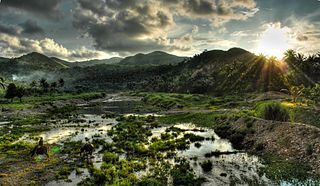
The Northwest Panay Peninsula Natural Park is located on the island of Panay, in the provinces of Aklan and Antique of the Philippines which was proclaimed a natural park by President Gloria Macapagal Arroyo on 18 April 2002. The Northwest Panay Peninsula Natural Park has an area of 120.09 km2, found within the municipalities of Nabas, Malay, Buruanga, Libertad and Pandan.

Panay Railways, Inc. is a government-owned and controlled corporation of the Philippines that formerly operated railway systems on the islands of Panay and Cebu. It is headquartered in La Paz, Iloilo City, and is a subsidiary of Phividec Railways, Inc. under the Philippine Veterans Investment Development Corporation (PHIVIDEC). While Panay Railways currently does not operate any trains, it leases its property, and the generated revenue is utilized to cover personnel and administrative costs associated with maintaining its assets.
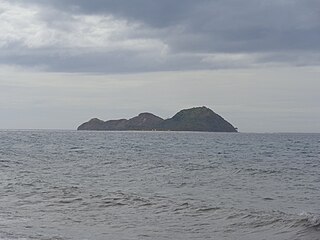
Mararison, also known as Malalison, is a small island and a barangay in Culasi in the Antique Province, on the island of Panay in the Philippines.
Liwagao Island, also known as Libago Island or Libagao Island, is an island located southeast off the coast of Mindoro and northwest off Panay. The island is a disputed feature between the towns of Bulalacao, Oriental Mindoro and Caluya, Antique with the latter exercising de facto administration over the island.

On April 26, 2018, the Philippine resort island of Boracay, one of the country's major tourist destinations, was temporarily closed to the general public as part of the Philippine government's efforts to rehabilitate and redevelop the island. As part of the closure, Boracay was closed for six months except to its registered residents and employees. The closure had a significant effect on the livelihood of local people. In 2022, the Philippine government declared that the closure was successful in rehabilitating the island's environment.



















